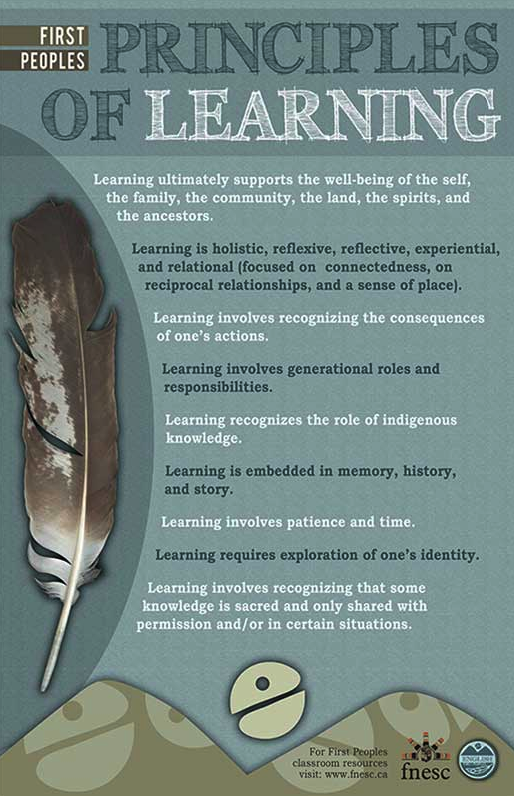
The First Peoples Principles of Learning (FPPL) are not something one can imbed into their practice through a checklist. To authentically imbed the FPPL, one must be making a conscious effort to understand and embrace all of the FPPL simultaneously. This is a very challenging metacognitive process, one that I am not sure can ever be truly mastered – nor should it be. If one were to truly imbed the FPPL, they would understand that the goal isn’t mastery, and that growth and learning never really end.
Exemplars of First Peoples Principles of Learning prevalent in EDUC 490 practicum experience:
To me, an interpretation of “Learning involves patience and time” could be that: Learning does not happen at the same time for everyone, and is not bound to the confines of a classroom. The fluid, cross curricular approach to place-based unit I taught in my EDUC 490 practicum embraced this. For this unit, I had two cohorts of Grade 8’s for both their Humanities and Science classes. I decided to blend the two coursed into one to authentically embody a cross-curricular approach. This meant that sometimes in “Science 8”, we did personal reflective writing, and in designated “Humanities 8” blocks we looked at our place through the objective lens of the scientific method. We successfully cast aside the rigidity of pre-prescribed course titles and put learning at the centre of our focus, and not subject-content (while it was still prevalent).
With daily reflections to show their learning, the cross-curricular, place-based unit embraced the idea of being reflective. The place-based approach promoted experiential learning, with a number of hands on activities to reinforce this. The cross-curricular approach, using both Science and Humanities blocks to complete this unit, modeled a more holistic practice. I tried to remind students daily that learning is not something that belongs solely in the classroom, but everywhere.
One of my biggest philosophies of education is the importance for students to take ownership for their learning. I reminded students each and everyday of this. If we were doing an activity to apply/enhance learning, and scaffold knowledge and skills for the summative task, I pointed out the importance of participating, however, I did make everyone aware that, as long as what they were doing did not negatively impact the learning and/or safety of others, I would not harp on them to do anything more than to minimally meet expectations. I vocalized that each day and task was an opportunity to take ownership for their learning, and that the deeper their learning leading up to the summative task was, the more they would get out of the summative piece. I like to think of this as an exemplar/embodiment of the First People’s Principle: Learning involves recognizing the consequences of one’s actions.